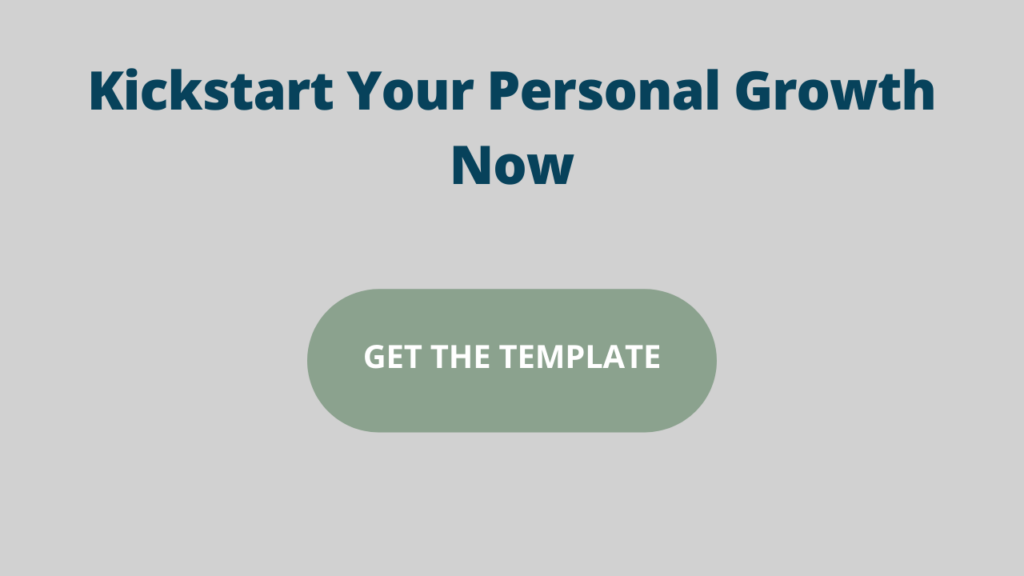I just quit law. After three months of being a lawyer.
Since 2013, law has been the dominating occupation of my life. For 9 years, I went to law school, prepared for my bar exams, did traineeships as a prosecutor, judge and lawyer. All of that work – just to say goodbye after I barely even started?
In retrospect, it feels inevitable and logical. But it was far from that. This is me making sense of what felt like a bunch of random, seemingly independent events at the time. It’s a prime example of “Connecting the Dots” looking backwards (hat tip to Steve Jobs).
So if you’re thinking about switching careers or having first doubts whether you really want to follow down the Default Path, but can’t see a similarly clear pattern emerge in your life: don’t worry. It’s a lot easier to see the pattern in retrospect than while you’re living through it.
Anyway, here’s the story of my career change and what I intend to do next.
The Default Path

I picked law mostly because of two reasons.
- what things do I not want to study?
- what opens up the most opportunities down the line?
I wasn’t really sure what I wanted to do with my life. Luckily, there was an accepted fall-back option: Go to Law School or Business School and figure out later what to do. Worst case scenario? You don’t enjoy your job too much, but you’ll earn a lot of money.
Paul Millerd calls this the Default Path. Go to a well-established university. Pick one of the respected topics. Learn how to play the game. Get a job at a prestigious company. Climb the career ladder. Succeed.
It’s what everyone around me seemed to be doing and so I did the same and went to Law School.
First Doubts
I enjoyed studying law. It was fun. I was around cool and interesting people. Plus, if you’re at university, you have a very clear game to play with obvious rules: get good grades.
Having a clear game felt good. It was an easy proxy to tell whether I was “doing well in life”. I had a hard time defining for myself what I wanted from life. So instead of trying to do that, I just adopted an external set of rules and put all my energy towards beating that game.
Yet, looking back, it feels like there were already some slight, slight doubts. What about the lifestyle associated with being a lawyer? Why is it that top law firms try to sell a reduction to 40/hours per week as innovation, but at the same time basically rule you out of the run for long-term promotions?
What’s more, whenever I was doing an internship or a trainee station, I didn’t really enjoy it. But then again, wasn’t that how work is supposed to feel? I rarely saw adults jumping excitedly around at the thought of their job.
So I just assumed this is it. Work is something you get through to get some reward on the other side.
However, after my first bar exam, I really wasn’t sure anymore whether I wanted to become a lawyer. More than a year of intense preparation had left me drained and I was a bit fed up with spending my whole existence around the singular topic of law.
At the same time though, I didn’t really have an alternative in mind. Business Consulting maybe. I wasn’t sure though whether PWC or McKinsey would really be that different from a law firm. And because I didn’t have any job experience in an area other than law, didn’t quite know what else to do.
I had a rough idea of going to Italy to work in a Michelin-starred restaurant and learn how to cook professionally. But I doubted that I would actually have the talent to make it far in that industry, so it was less of an alternative career path and more of a “this-sounds-like-a-cool-experience” kind of project (and yes, it’s still on my bucket list).
So I kept doing what I knew best: prepare to win the next game on my list, aka getting good results at the second bar exam.
How an iPad actually changed my life

Earlier on in my university career, I got RSI (Repetitive Strain Syndrome) in both my hands because I mistakenly assumed that I don’t need to pay attention to my posture.
(if the same is true for you, please please start looking into correct posture. Here are some strategies & some stretches as a starting point.)
Because of that, I could barely spend more than 30 minutes a day typing on a computer or using a mouse. Up until this point however, all my studying happened in front of a computer, typing out summaries or scrolling through lectures. Which meant I had to completely change my approach to learning.
After a while, I started playing around with writing on my iPad as a compromise between not using a keyboard but still having digital notes. And then, one day, I searched YouTube to find the best note-taking apps for iPad.
And I found Ali Abdaal.
At first, it was just a few videos closely related to what I was doing. How to take notes on your iPad. Effective Study Techniques. Exploring fun new apps.
From there, it was a quick drop down the productivity rabbit hole of the internet. YouTube’s algorithm is very good at keeping you hooked once you show some interest – and within a matter of weeks, I was following a ton of productivity creators and subscribed to countless new newsletters.
(Speaking of YouTube: I have a small channel too that you should definitely check out if you’re interested in Notion )
After a while, I stumbled upon an interview between Ali Abdaal and Khe Hy. And I was hooked. Khe was talking about productivity and personal growth (two of my favourite topics), but also a ton about the deeper reasons behind it.
- Why do we even want to be more productive?
- How can I be happier?
- When do we know when we have “enough”?
Within just a few months, I got exposed to a wide range of ideas. So many new concepts, frameworks and potentially life-changing ideas around me. Entering the world of productivity felt a bit like standing under a waterfall – the sheer amount of information, hacks and tricks suddenly available to you is crazy.
But the thing is: for the most part, I was only reading about productivity.
I had tons of insights. But I didn’t turn (m)any insights into action.
Leaving the village & moving to the internet
Then, three things happened:
- I listened to an awesome podcast by Ali Abdaal and his brother Taimur Abdaal
- I found Nat Eliason’s blog and his article “How to start a blog that changes your life”
- My girlfriend started her own freelance business
The first two gave me the idea that having a blog could be kind of cool (plus an actionable plan on how to get started). The last gave me the push to actually do it and start writing online.
One day, while talking about various topics she could write about on her blog, she asked me whether I’d want to write about a thing or two since I seemed to enjoy talking about writing online so much.
And so, I wrote my first ever piece to be published on the internet. On D2C brands in the men’s fashion industry.
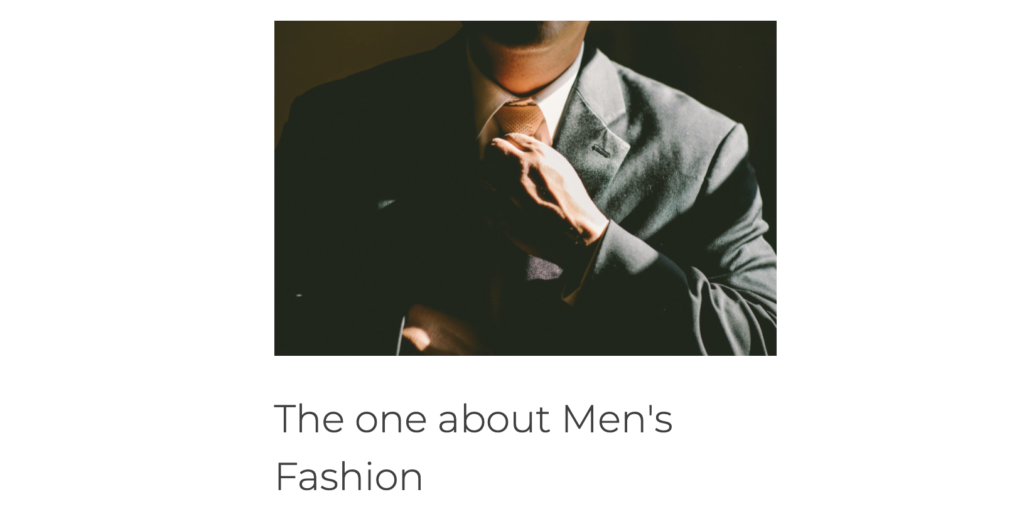
From this guest post, it was a quick jump to setting up my own blog matthiasfrank.de together with my newsletter Holistically Speaking. In terms of topics, I pivoted to writing about “how to lead a good life” aka productivity, personal growth and effective learning.
My plan was easy: start writing about all the things I read soooo much about hoping that it would help me better implement some of these ideas and frameworks.
I had little idea about website design & co., but again, my girlfriend helped me out and build the first version of my blog for me. Here’s how it looked:
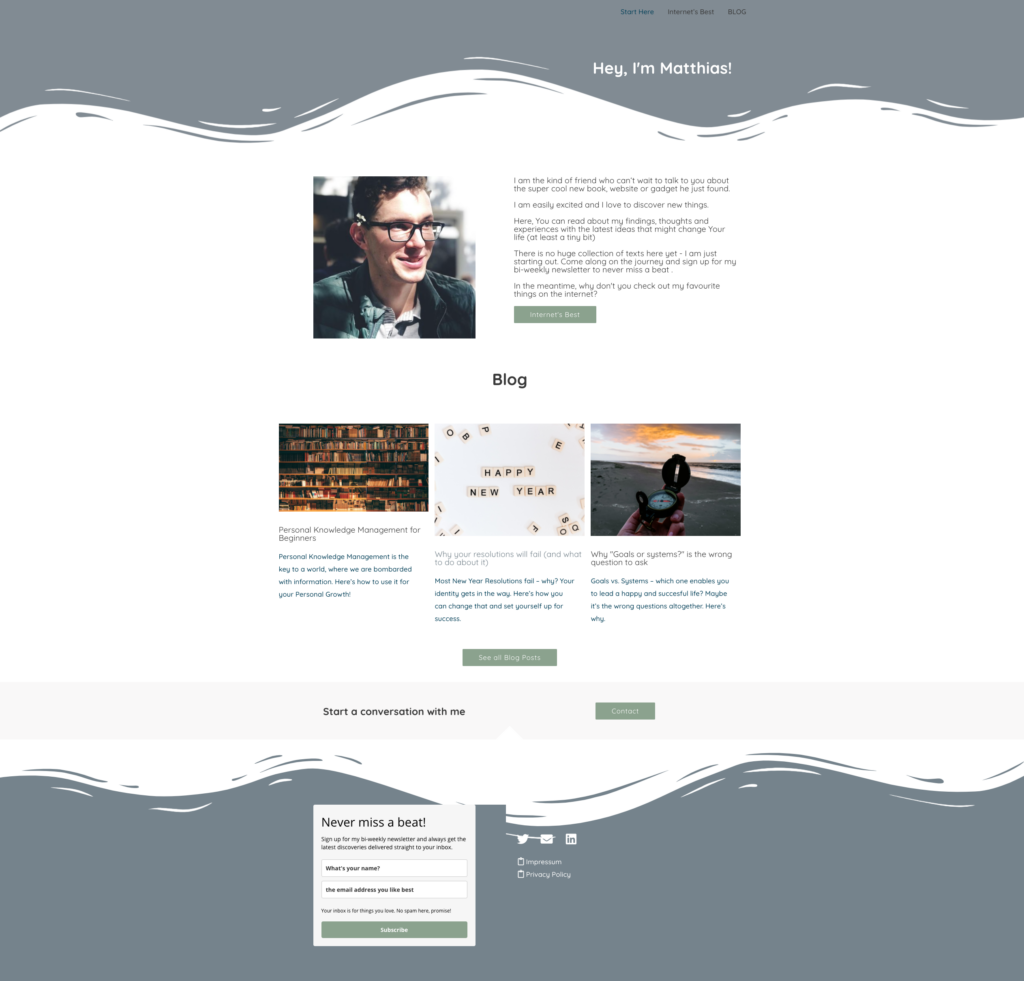
I got all my friends and family to subscribe to my newsletter, so I started with roughly 20 people on my list. Needless to say, growth was slow but it was super cool to see that people actually opened my emails.
(well they had to. They were friends and family after all )
But it was an email that I did not expect to be opened that ended up changing everything.
Writing a $10K Email
At that time, during my traineeship for the second bar exam and a few months into my productivity phase, I was attending pretty much any free event I could.
One that got me particularly excited was the $10.000/Hour Work Bootcamp by Khe Hy. It was a free five day course leading up to his flagship offer Supercharge Your Productivity. And I couldn’t believe just how much value he gave away for free.
Quick side note about $10K work. The $10K Framework is one of these “big ideas” like Deep Work, PARA or the 1% improvements from Atomic Habits. It’s a mental model to help you prioritise your tasks, find your personal leverage and spend time on the things that actually move the needle.
(it’s not about the exact price tag – the $10K is just a way of labelling work that’s 1000x more impactful than $100 work)
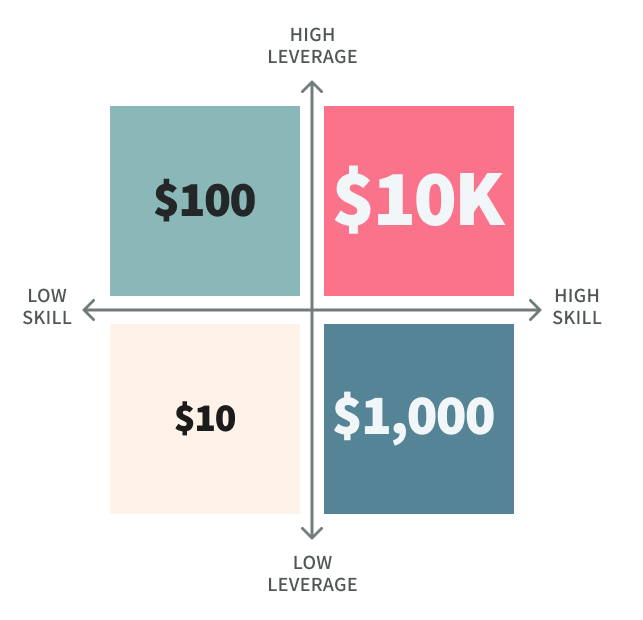
- Low Skill / Low Leverage: $10 Work is the kind of work you could do hungover. You know, answering a never-ending barrage of emails, picking color schemes for your powerpoint or any other task on your to-do list that’s quick to tick off, gives a dopamine boost, but doesn’t really move the needle.
- Low Skill / High Leverage: $100 Work is all about doing $10 tasks more efficiently, like learning keyboard shortcuts to answer your emails quicker. It can certainly speed up your workflow and play an important role, but it’s crucial to remember: you’re optimising things that don’t have the biggest impact on your life.
- High Skill / Low Leverage: $1000 Work is the land of specialised services. Whenever you use your hard earned skills to solve an individual problem, it’s $1000 Work. It’s an awesome area to be in, but one thing is lacking: leverage. If you stop doing it, you stop seeing results.
- High Skill / High Leverage: $10K Work covers activities with disproportional big payoffs. It’s hard to explain, but you usually know it when you see it. It’s the kind of stuff that will actually determine your life 5 years down the line. But it’s also highly uncertain. Lots of work that you do in that area won’t amount to anything. But whenever it does, it has the potential to change everything.
(if you want to learn more, you can check out his free $10K Training over at radreads.co)
So, where were we?
Ah yes. The $10.000/Hour Bootcamp, Khe’s first major event structured around the $10K Framework. And I had a front row seat.
It was a fascinating way of framing the tasks you do. My mind was full of ideas relating to the $10K Framework. For a moment, I thought of writing a blog post about it. But then I decided to rather share my thoughts with Khe. It was his framework after all and I wanted to try and give something back for all the value I got out of the bootcamp.
So I wrote him a loooooong email.
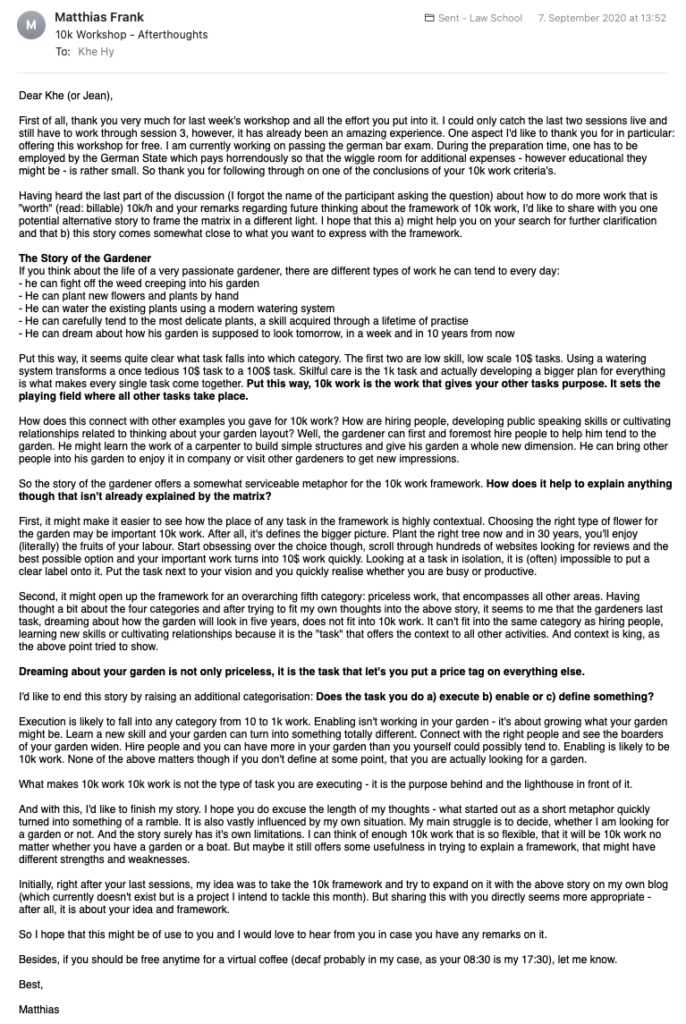
In retrospect, it’s easy to count that as $10K work.
It was a random shot, something that had an incredibly high upside (potentially connecting with someone whose work was absolutely fascinating me) but also a high chance of failing (I mean he has 30.000 people on his email list. What are the chances he reads mine?)
But in the moment, I just wanted to share my excitement and try to be as helpful as possible.
Even if that email would just get buried amongst others.
But I actually got a reply.
Everyone lied to you
Before I started writing and sharing online, I kind of assumed that people who post online get harassed 24/7, that trolls are everywhere and the best you can hope for is that you only get scammed instead of ending up in a shitstorm.
But actually, the internet is a pretty awesome place. And people are incredibly generous, kind and supportive.
(don’t get me wrong. There are bad things happening on the internet. And online bullying or harassment is no joke. But as with most other things, the news cycle distorts the picture and rarely reports on all the good things that can come from this level of connection)
Exhibit A: me getting a response from my idol.

You can ask my girlfriend: I got so excited, I was like a puppy on caffeine.
And that excitement only grew when we kept exchanging emails irregularly the following weeks. After each free event, I would sit down and write another email with all the thoughts I had together with ideas for improving the next event.
- Why not create a short summary of the event and hand it out to attendees as a checklist?
- How exactly would you balance having goals and being happy in the moment?
- A “read in browser” link would be a huge help to web-clip your email articles into Notion
And each time, Khe would reply and we’d have a short conversation.
It all ended with him actually INVITING me to take part in Supercharge Your Productivity – his flagship course on productivity & how to lead a happier life.
(Remember, the one I could have never ever afforded at this point in my life.)
I was stoked! This was awesome!
There was just one little problem.
The course was scheduled for February 2020.
And I was supposed to write my bar exam in April 2020.
Whoops.
Priorities (and asymmetric bets)
I had been studying for my second bar exam for about 8 months at that point. My day-to-day evolved around learning. Even most of my blog articles were around the principles of effective learning, how to deal with stress and my favourite study techniques.
And as everyone knows who has ever written any sort of exam: the longer you prepare and the closer you get to the date, the more you realise how much is still to do.
Yet, I knew that I really, really, really wanted to do that course.
There was just so much going for it:
- I would learn a TON about productivity
- I’d get to meet awesome people who share the same interests and ask the same questions
- The course might help me figure out what I actually want to do with my life
So I did it.
Each day for one month, I would spend more energy on learning about productivity, existentialism and Notion than on preparing for my bar exam that was looming around the corner.
Which was a drastic shift in priorities compared to my first exam.
I prepared one year full time for my first bar exam (a normal duration btw). I didn’t do anything else really. No real sport. No hobby other than playing League of Legends. No real contact to anyone except my friends who were preparing with me.
All to get the best possible result.
And it sort of worked. I got awesome grades. I pushed to the last few % that were possible.
But was it worth it?
(I had a physio therapist helping me with my RSI during that time. When it flared back up in preparation for the second exam, I met him again. First thing he said when he saw me: “wow, you look so much healthier than last time”. Makes you think if a otherwise total stranger comments on how shitty of a form you had last time)
For my second exam however, I had early on decided that this time, I would optimise for efficiency, not output.
Not the highest grade possible.
Not the most thorough preparation ever.
Just “enough” to have a decent showing and good pass grade.
And because of that, taking the course only made sense. After all, I had already spend months studying. I was trying to focus on the highest leverage activities, the ones that would really move the needle (you know… kind of the $10K work of studying ).
So while an extra 20 hours of study time would have certainly helped me improve a little bit, the potential reward for spending that time differently was vastly bigger.
In other words, my preparation had reached the point of diminishing returns. The marginal utility dropped. So I prioritised something else.
(plus, I just had a ton more fun doing the course. That might have been a reason too. But mainly that it was the hyper-rational thing to do. Obviously)
Doing the course instead of focusing full time on my bar exam was certainly a bet. But one with hugely asymmetric payout. I was confident that I would be able to pass the bar either way (maybe just barely, but a pass at least). Still, a bet.
But oh boy, did that bet pay off.
I would pay to do this kind of work
“Hey, do you want to do this for money?”
I could not believe it.
Throughout the course (which was an absolute blast. So much fun. So many cool people. 10/10 recommend over bar exam preparation), I had helped Khe with a few small tasks. Proofreading some texts. An excel sheet here. A checklist there. Oh and providing nit-picky feedback.
Then, all of the sudden, he asked whether I wanted to work for him.
Quick side note. There’s a popular decision making technique out there for people who tend to say yes to too many things. You’re only allowed to commit to something if it’s a “Hell Yes” – otherwise it’s a no. This definitely was a “HELL YES” kind of question.
And with that, I went from attending every free event live to actually working on these (and other events). It was awesome. I was learning a ton. And I could not believe that I was paid for that.
For the first time, I was having a ton of fun and intrinsic motivation doing something that could rightfully be called work.
Up until then, there was a clear devision. I had hobbies, interests, things I just loved to do.
- binging Chef’s Table and reading cook books
- playing video games
- learning about productivity methods (yeah, that’s actually fun for me)
And then there was the world of obligations, the world of work – which was a necessary evil.
Before reading the 4HWW, I never much reflected on my image of work. As something you just had to do five to six days a week, for most of the day, for the part of your live between 20 something and 67.
That image had gotten a few cracks, but now for the first time, I could see an actual alternative.
And once you see it, it’s impossible to unsee.
Becoming a lawyer… for 3 months
I was having an absolute blast helping Khe & Jaen prepare for the next cohort of the course.
(oh and quick side note – I successfully passed the written part of my second bar exam before starting the side gig. I scored a little lower than in my first one, but still far above passing grade and enough to join any law firm I wanted. Certainly got a bit lucky here, but still: it took a fraction of the work)
But among all of this, there was still one thing looming. I had promised my family that I would start working as a lawyer in December.
I had strong doubts about the day-to-day work and lifestyle of a lawyer, but at the same time I didn’t quite have it in me to quit 8 years of combined education in law without at least giving it a try. I needed some more time to choose between the obvious career track and the Pathless Path, leaving everything behind that I knew about careers and trying to figure out what else I could do for a living.
My plan was to become a lawyer, gain some job experience and evaluate after one year whether I want to continue down the Default Path – or not.
I lasted for three months.
And then I quit.
The frameworks for my career change

I would love to give you a blueprint and step-by-step guide of how I approached this decision and the lessons that you can take away to use in your own life.
The truth is though, that at some point, it just happened.
I was thinking a lot about the decision and slowly but steadily, my thoughts shifted. From “In a year, I’ll decide what I want to do” to “I would love to do something else, but now I still have that year to finish” until I finally reached “I don’t want to spend another week doing law”.
But I’ll try to summarise quickly some thoughts or frameworks that at least in retrospect, help me put my decision into some sort of rational context:
You should try more than just one job
When we grow up, we internalise stories and assumptions that help us make sense of the world. One particularly strong story that I never paid much attention to but still somehow lived by is this:
The reason you get paid for work is because you need an incentive to do it. You would rather be somewhere else. But your employer pays you x amount per month so that he owns your time Monday to Friday, 9 to 5.
I did not really enjoy my internships and trainee stations. I worked in cool teams, on interesting and challenging cases so it really wasn’t the work environment. I just didn’t enjoy the type of work I was supposed to do.
But then again, that’s why I was paid for it, no?
It never once occurred to me that I could be paid for something that I’d do just the same if it wasn’t for money.
(besides that short time frame where I dreamed about becoming a professional esports player )
One of the reasons for this? I never worked outside of law. All my jobs were always in that field. I obviously tried different areas of law and different roles but never something totally different.
(That’s why I really wanted to cook in a professional kitchen. Trade in knowledge work for physical work for a while)
So if you’re in the (incredibly) privileged position where you can try out various types of jobs: go for it! How are you supposed to measure how much you like a job if you have nothing to compare it to?
Another way to get some perspective: if you won the lottery and all your expenses would be covered for the rest of your life, what would you change?
- Nothing and continue doing the work you do?
- Change a few things, maybe work less hard, but still roughly keep your occupation?
- Run away, screaming and jumping for joy and never look back?
Again, to be in a situation where you can think about these kind of things is a crazy privilege. Enough people can’t afford this luxury. But in my case, it wasn’t my circumstances that kept me locked in place and on a singular path. It was just me, refusing to consider actual alternatives and not being brave enough to do something “unusual”.
Once you see alternatives, there’s no way going back
One thing I massively underestimated was how much energy it would cost me to be a lawyer. I was optimistic that I could do the year and then make a decision. But a few weeks in and I wanted out.
It wasn’t so much that the work was worse than what I had seen before in internships and trainee stations. What had changed however, were the opportunity costs.
In an article, Scott Young talks about recent research into effort. The new idea? How hard something feels in the moment isn’t so much a question of discipline or willpower. It’s how your brain perceives opportunity cost.
Trying to study and your phone with a ton of exciting dopamine hits lies right next to you? Or there’s amazing weather and all your friends are out grilling? It feels much, much harder to sit down now than if you lock your phone away for the day and a storm is howling outside.
In my case, I had seen my alternative. How I could spend my day differently. The new opportunities that were waiting for me. Knowing all of that, it felt a hundred times harder going to the office and trying to focus on law.
Which didn’t feel so good. I was a bit annoyed with myself: why couldn’t I just follow through for that limited time? It was only a few months after all. Nothing in comparison to the 8 years I had been doing law for already.
It wasn’t until my girlfriend asked me “why waste another day or week doing something you don’t like if you have an actual, real alternative?” that I accepted the situation. Time for a career change.
I was in the incredibly lucky situation to decide on my own how I’d spend my time and earn my money. The only reason to stick longer with law would have been to prove to myself that I can suffer through it. Not the smartest choice for someone who claims that he’s “trying to figure out how to lead a good life”.
Living live for retirement

When I still assumed I’d be a lawyer, I rarely thought about all the fun I’d have between 30 and 65. It was “somewhat fun preparation to become a lawyer” – “being a lawyer” – “enjoying the fruits of a long career once I am retired”.
And it wasn’t until I read the 4HWW until I realised how weird that way of thinking was.
Sometimes, the 4HWW gets reduced to things like “outsource everything” or “build passive income on the internet so that you can lay on the beach all day”.
But actually, those things are just means to an end. The 4HWW has a very different core message:
How do you structure your life so that you can do actually meaningful things?
So if you’ve only heard of the 4HWW and thought “well that sounds a bit click-baity” – give it a read. I’m sure it will surprise you.
Back to the example of retirements. I assumed I’d be doing something for the biggest part of my life that I did not really enjoy to then some day be free to do whatever I want. There were two big flaws though:
- How am I supposed to know at 65 what I want to do if all I’ve done so far is work in a job I kind of don’t like? Being a lawyer full time doesn’t really leave much room for experimentation.
- It’s not a given that I make it to 65.
Yes, life expectancy is rising each year and I rolled incredibly high on the “How-much-privilege-can-you-accumulate-in-one-person” scale.
Still, it’s a numbers game. No one knows what’s going to happen.
The remedy suggested in the 4HWW? Mini-retirements. Instead of waiting till some random age, take an occasional month or two off to do something completely different.
That, however, while nice in theory is completely at odds with how most workplaces (particularly the fairly conservative law environment) are organised.
So if I actually buy into this idea of not hitting pause on your life until retirement (which I do) and want to make it a reality (which I at least say that I do), then I need to structure my work life in a way that can enable this.
And I just don’t see that with a traditional career path.
Life after Law (what’s next)
Starting 1st April, for the first time in 8 years, law won’t be my main occupation.
I don’t really know where I want to be in five years. Most of my mental energy those past few weeks went into the “should I quit law”-decision. Now that this is settled, I hope to find a bit more room to explore and think.
Here’s the rough plan though:
- I will support RadReads as an external consultant, helping with various backend tasks like automations, building Notion templates, writing emails or optimising SEO. I have no formal training whatsoever in this area, just a ton of enthusiasm, so I am still a bit in disbelief that I can “work” in this area. Either way, I am incredibly grateful for being given this opportunity.
- I will continue to write my by-weekly newsletter Holistically Speaking and build out my “Personal Brand”. For the first time, I’ll be also offering 1 on 1 coaching in Notion as well as services to help you save a ton of time using the power of automations. If you’re interested in working with me, send me an email.
- I’ll use this crazy amount of freedom and flexibility to figure out how I can balance work, fun and all the other things that matter to me. I’ll be documenting that journey on this blog and in my newsletter. I’m still trying to figure out how to lead a good life.
I’ll end this far too long story on how I got here with one of the first lines I’ve heard from Khe (that feels very relevant again now):
Good Work. Done Well. For the right reasons
See you on the other side.


